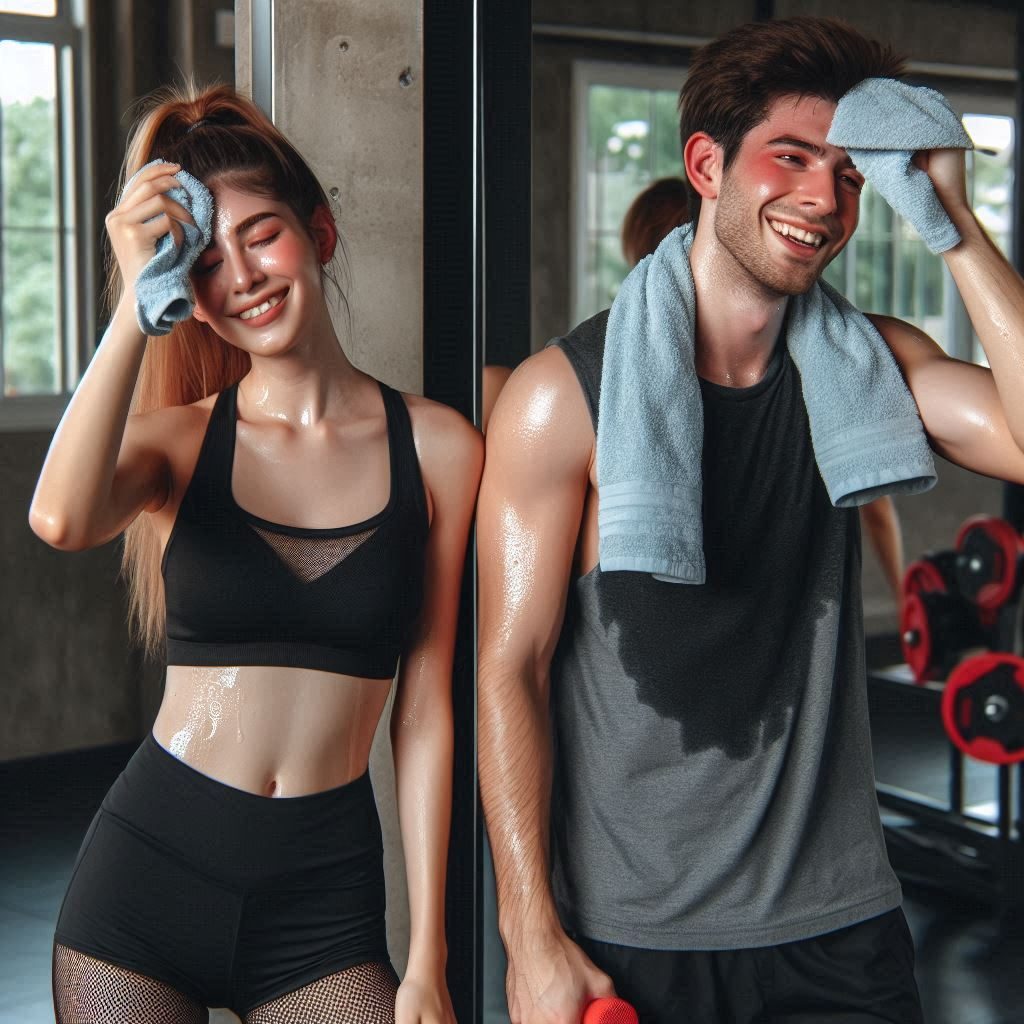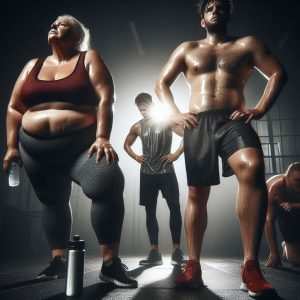
What It Means When You Sweat And Sweating For Your Workout
Sweat and sweating is an interesting body function. It’s the body’s natural air conditioner, released during a workout, on a hot day, or in a stressful situation. But what does it actually mean when it comes to working out?
What is Sweat?
Sweat is primarily water, but it also contains minerals like sodium, potassium, calcium, and magnesium, as well as small amounts of urea, lactic acid, and other substances. It’s produced by sweat glands located all over our body, with the highest concentration in the armpits, palms, and soles of the feet.

Why Do We Sweat?
The primary function of sweat is thermoregulation – it helps to cool down the body. When we exercise, our body temperature rises. To prevent overheating, our body produces sweat, which evaporates from the skin surface, taking away excess heat and cooling us down.
Sweat and Workout Intensity
The amount of sweat produced can be an indicator of workout intensity. The harder you work, the more heat your body generates, and the more sweat you produce. However, it’s not a perfect measure. Factors like genetics, hydration status, and environmental conditions also influence sweat rate.
Sweat and Fitness Level
Interestingly, fit individuals tend to sweat more and sooner into their workouts. This is because their bodies have become more efficient at cooling down. So, if you’ve noticed that you’re sweating more as you get fitter, it’s a good sign!
Sweat and Hydration
Sweating can lead to fluid and electrolyte loss, which if not replaced, can result in dehydration. This can negatively impact performance and recovery. So, it’s crucial to stay hydrated before, during, and after workouts.

Sweat and Calorie Burn
Contrary to popular belief, sweating doesn’t necessarily mean you’re burning more calories. While there’s a small amount of energy required to produce sweat, it’s not significant enough to contribute substantially to calorie burn.
The Role of Sweating in Exercise
Sweating plays a crucial role in our body’s function, especially during exercise but in everything we do depending if we need to sweat to help the situation.
Thermoregulation
The primary role of sweat is thermoregulation. When we exercise, our muscles generate heat, raising our body temperature. To prevent overheating, our body produces sweat. As sweat evaporates from our skin, it takes away some of the body’s heat, helping to cool us down.
Hydration Balance
Sweating helps maintain our body’s hydration balance. When we sweat, we lose water and electrolytes, which triggers the sensation of thirst. This encourages us to drink, helping to replace the fluids we’ve lost.
Skin Health
Sweating can also contribute to skin health. When we sweat, our pores open and release built-up dirt and oils. This can help to keep our skin clean and reduce the risk of problems like acne.
Detoxification
While it’s a minor role, sweat does contribute to detoxification. Sweat contains trace amounts of toxins that our body has processed. When we sweat, these toxins are removed from our body.
Fitness Indicator
Finally, sweat can serve as an indicator of fitness. Fitter individuals tend to start sweating sooner into their workouts and may sweat more overall. This is because their bodies have become more efficient at cooling down.

Sweat And Sweating
————————
Pro Athlete vs. Everyday Person
Sweating is a natural response to exercise, but the way our bodies sweat can vary greatly between a professional athlete and an everyday person. Here’s how:
Sweat Onset
Professional athletes often start sweating earlier in their workouts compared to everyday individuals. This is because their bodies have adapted to their intense training regimes and have become more efficient at cooling down.
Sweat Rate
Athletes typically have a higher sweat rate, meaning they produce more sweat during a workout. This is due to their higher level of fitness and the intensity of their workouts. In contrast, an everyday person may sweat less because their body isn’t working as hard or isn’t as accustomed to high-intensity exercise.
Sweat Composition
The composition of sweat can also differ. Athletes often lose more electrolytes in their sweat, especially sodium, due to their high sweat rate. This is why athletes often need sports drinks or electrolyte replacements during long or intense workouts. On the other hand, the sweat of an everyday person may contain fewer electrolytes, and drinking regular water is usually sufficient to stay hydrated.
Sweat Efficiency
Athletes tend to have more efficient sweating systems. Their bodies have adapted to regular, intense exercise, and they can cool down more effectively without losing as much fluid. Everyday individuals, on the other hand, may not sweat as efficiently, which can lead to quicker dehydration during exercise.
Conclusion
Sweat and sweating are a natural and essential part of working out. It’s a sign that your body is working hard and efficiently. However, it’s important to remember that sweat rate is influenced by many factors and varies from person to person.
It might be a bit uncomfortable, but sweating is a natural and beneficial part of working out. It’s a sign that our bodies are working hard and responding appropriately to the demands of exercise.
Both professional athletes and everyday individuals sweat during exercise, the onset, rate, composition, and efficiency of their sweating can vary significantly. These differences are due to factors like fitness level, workout intensity, and the body’s adaptations to regular exercise. So, whether you’re an athlete or an everyday gym-goer.
So, don’t compare your sweat and sweating with others. Instead, focus on your own workout intensity, stay hydrated, and enjoy the benefits of exercise! Sweat and sweating is important to everyone.
Join the Discussion
We’ve explored the science of sweat, its role in exercise, and how it differs between professional athletes and everyday individuals. But now, we’d love to hear from you!
Have you noticed changes in your sweat as your fitness level has improved?
What strategies do you use to stay hydrated during workouts?
Have you ever experienced challenges related to sweating, such as dehydration or electrolyte imbalances? How did you overcome them?
Do you have any tips or advice for others about managing sweat during exercise?
Sharing your experiences and insights can help others on their fitness journey.
#Fitness #Workout #Sweat #Exercise #Health #Hydration #Athletes #GymLife #Training #BodyCooling #Thermoregulation #SkinHealth #Detoxification #SweatRate #SweatComposition #SweatEfficiency #Electrolytes #WaterIntake #FitnessGoals #FitnessJourney #HealthyLiving #ActiveLifestyle #StayHydrated #WorkoutIntensity #FitnessLevel #GymGoers #ProAthletes #EverydayFitness #ExerciseScience #JoinTheDiscussion





